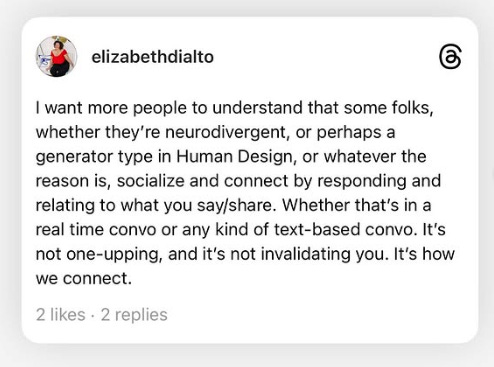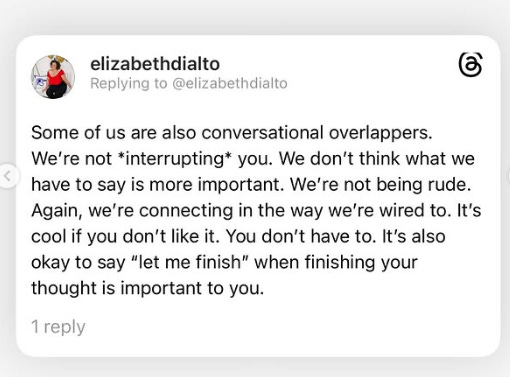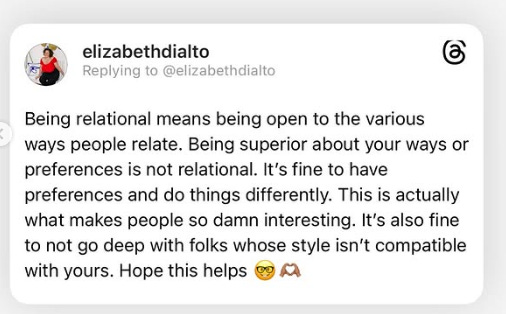As much as I have cleaned up my negativity and strengthened my positivity bias, I have noticed over the last couple years that I still do a lot of ranting in my head. So, I started paying attention to what I am angry about in the background. This has lead to me ending a couple friendships that were keeping me in a certain role or certain belief about myself. And, since I am self-aware to a flaw, I have been scouring my own behaviors for the similar issues within those friendships. One big complaint I had with two of these friendships in particular was that I never felt like I was being listened to or heard. I too often felt that I was always explaining myself because they just were not responding in a way that told me they understood what I was saying - mostly because they would often interrupt me and explain to me what I was experiencing or talking about. As if they knew my life and experiences better than I did. I promise I won’t belabor these rants. I promise that, ultimately, this post is about my own goal of becoming more curious about people and less reactive. I share these issues about those friendships as context.
In a culture that diminishes women, I find that we have a big need to prove that we know something or understand something. And, some of us just have a big and burning need to say things - to be involved in the conversation in some way. I’ve noticed that this leads to people listening for the purpose of responding rather than to understand what is being said or shared. I fall into this trap too.
One of my 2025 goals is to become a better listener and I have often had this as a goal and its still a goal because I have never been very specific about what it means to listen better. If you had asked me before what that meant, I would have rattled off some definition like a child reciting a definition he doesn’t really understand. This time I am specific in what that would look like and how I would do it. It involves listening to understand and not to reply. It involves looking at the other person’s perspective through the lens of curiosity rather than proving or validating my worth or value. Looking at it from their perspective is not projecting onto them what I think they should be feeling or are thinking - but asking what their perspective is and then listening.
I started writing this post back in December and kept putting off finishing it. While I am not one of those people that believes every single delay is a divine intervention, the delay in posting did open up the opportunity to discuss another aspect of how we listen or don’t listen and that’s from a neurodivergent perspective. I am signed up for Elizabeth Dialto’s emails and I follow her online. I cannot remember if I have shared her work before. I should return to sharing cool people I know and follow. She is one of them. I like her work. She recently shared the below screenshots in a carousel on IG.
She added this additional context to the caption:
I’m lucky that most of my friends are also neurodivergent conversational overlappers. None of us mind the “interruptions,” or tangents. We circle back to what matters, abandon the open threads that don’t, and we’re happy to connect in our spicy, non-linear ways.
We also tend to interrupt *ourselves,* mid thought and mid convo all the time, which lets you know it’s not about thought superiority or self-importance. It’s how our brains move, connect dots, pivot, process and take in information.
Years ago I had an acquaintance who posted a rant on FB about how rude it is when people interrupt, essentially trashing anyone who does this, leaving no room for any curiosity or nuance as to why. This was a person who also talked a lot about healing and liberation. Clearly, this was a gap in her lens for inclusivity. (We all have to work those out!)
And listen, I get that there are folks who interrupt and talk over people in a sh*tty way, too.
In a world with so many issues and scary things going on, I’m just way more interested in finding reasons to connect with folks and adjust accordingly when there are incompatibilities.
We miss out on so much needing to be right about things that don’t matter.
I love this post because this is how I interact with people and what she says about the style and intention is spot on for me. I interrupt myself constantly. I am also a Generator in Human Design and I probably am neurodivergent in some way or other. I have one friend that while she has never said anything about it, I am certain she can never follow what I am saying because I interrupt myself and go on tangents so often.
This social media post also helps me reframe the two ex friends I mentioned earlier. Maybe they don’t realize. I know one of them in particular will respond to something with “oh. I know what you mean…” and then go on to describe something that is completely off base from what I was talking about. That behavior would bother the hell out of me, but maybe it is her neurodivergent way of trying to relate. I don’t know because I have never asked. I also feel a little called out when Elizabeth warns against being superior about our ways and preferences. Those two ex friends would absolutely agree that I have a tendency to be superior.




